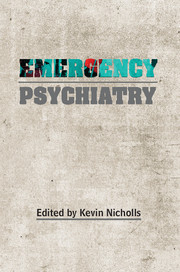Book contents
- Frontmatter
- Contents
- List of contributors
- Acknowledgements
- Preface
- 1 Assessment of suicide risk
- 2 Violence and aggression
- 3 Substance misuse emergencies
- 4 Alcohol and psychiatric emergencies
- 5 Acute psychosis
- 6 Acute side-effects of psychotropic medication
- 7 Emergencies in child and adolescent psychiatry
- 8 The psychiatric intensive care unit
- 9 Safeguarding
- 10 Emergency electroconvulsive therapy
- 11 Life-threatening medical emergencies in a mental health unit
- 12 Emergencies in intellectual disability psychiatry
- 13 Emergencies in older persons’ psychiatry
- 14 Perinatal psychiatric emergencies
- 15 Civilian and military psychological trauma
- 16 Emergencies in liaison psychiatry
- 17 Psychiatric emergencies in deaf people
- 18 Mental health law
- 19 Self-poisoning: aspects of assessment and initial care
- Index
13 - Emergencies in older persons’ psychiatry
Published online by Cambridge University Press: 01 January 2018
- Frontmatter
- Contents
- List of contributors
- Acknowledgements
- Preface
- 1 Assessment of suicide risk
- 2 Violence and aggression
- 3 Substance misuse emergencies
- 4 Alcohol and psychiatric emergencies
- 5 Acute psychosis
- 6 Acute side-effects of psychotropic medication
- 7 Emergencies in child and adolescent psychiatry
- 8 The psychiatric intensive care unit
- 9 Safeguarding
- 10 Emergency electroconvulsive therapy
- 11 Life-threatening medical emergencies in a mental health unit
- 12 Emergencies in intellectual disability psychiatry
- 13 Emergencies in older persons’ psychiatry
- 14 Perinatal psychiatric emergencies
- 15 Civilian and military psychological trauma
- 16 Emergencies in liaison psychiatry
- 17 Psychiatric emergencies in deaf people
- 18 Mental health law
- 19 Self-poisoning: aspects of assessment and initial care
- Index
Summary
In the UK, the proportion of elderly people in the population has increased dramatically. At the beginning of the 20th century, approximately 4% of people were aged 65 years or over. Today the proportion is approximately 16%. It is predicted that by 2050 the proportion of the UK population aged 65 years and over will increase from the latest figure of 11.1 million to 19 million (AgeDiscrimination.info, n.d.; Cracknell, 2010).
Psychiatric emergencies are common in the elderly. The diagnosis and treatment of psychiatric emergencies in geriatric patients can be challenging, owing to the increased incidence of medical and neurological comorbidities, psychosocial problems and medication-induced adverse events. The most common psychiatric emergencies in the elderly are depression with suicidality, delirium, dementia with behavioural disturbance, substance abuse, elder abuse, conditions resulting from iatrogenic causes, and stupor. Failure to recognise the conditions presenting as psychiatric emergencies in the elderly could lead to the development of complex clinical presentations and increased health expenditure (Borja et al, 2007). This chapter discusses the key issues in the diagnosis, assessment and treatment of these prevalent psychiatric emergencies in the elderly.
Depression and suicide
Late-onset depression is a common and potentially life-threatening illness. It remains poorly recognised and undertreated (Borja et al, 2007). Symptoms such as loss of appetite, decreased energy, lack of sleep, and multiple psychosomatic complaints tend to overlap in psychiatric and medical illnesses. Moreover, physicians might consider depression in the elderly to be a normal reaction to life events such as the death of a spouse, the development of multiple medical conditions, retirement, becoming increasingly dependent and the loss of purpose in life (Borja et al, 2007). Delaying treatment for late-onset depression is associated with increased mortality, functional impairment and use of healthcare resources. Luber and colleagues (2000) found that those with depression had nearly twice as many primary care visits, twice as many referrals to specialists and more than twice as many radiological tests, compared with non-depressed controls.
The prevalence of major depressive disorder in older persons varies, from 1–5% in the community, 5–10% in medical out-patients, 10–15% in medical in-patients and up to 42% in long-term care facilities (Piechniczek- Buczek, 2010).
- Type
- Chapter
- Information
- Emergency Psychiatry , pp. 228 - 239Publisher: Royal College of PsychiatristsPrint publication year: 2015



